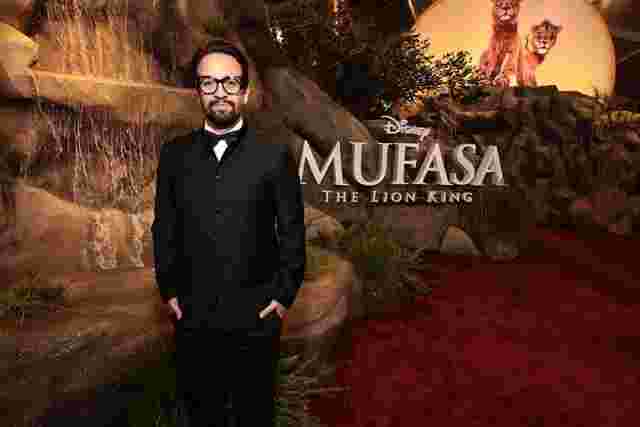HOMBRE Exclusive: Lin-Manuel Miranda Creates New Music Magic With “Mufasa: The Lion King”
20 Dec 2024 by Pedro Aristes in Advice, Advice, Business, Career, Celebrities, DVD, Ego, Event, Fame, Film, Films, General, Home, Money, Music, Pleasure, Power, Profile, Stars, Television, Theater

After securing a star on Hollywood’s Walk of Fame and already winning a Pulitzer Prize, five Grammys, three Tonys, two Primetime Emmys, and multiple other honors, the Academy Award remains the only accolade missing for Lin-Manuel Miranda to join the rarefied air of EGOT. His latest musical contributions to “Mufasa: The Lion King” are destined to accomplish that goal, or at least earn him multiple Oscar nominations.
In an exclusive conversation Miranda opens up about his inspirations, talks about creating new music while keeping “The Lion King” legacy alive, and shares what he hopes his music means to audiences.
 Known as an actor, composer, lyricist, and writer who originated some of Broadway’s most enduring and awarded productions including “In the Heights,” and “Hamilton,” Miranda lately has been concentrating on developing original music for film. “Encanto,” and “Moana” has produced some of his best known songs.
Known as an actor, composer, lyricist, and writer who originated some of Broadway’s most enduring and awarded productions including “In the Heights,” and “Hamilton,” Miranda lately has been concentrating on developing original music for film. “Encanto,” and “Moana” has produced some of his best known songs.
 Now he faces one of his greatest challenges when invited to contribute new music for the legendary ‘Lion King’ universe, and what will surely become a year-end blockbuster, “Mufasa: The Lion King.”
Now he faces one of his greatest challenges when invited to contribute new music for the legendary ‘Lion King’ universe, and what will surely become a year-end blockbuster, “Mufasa: The Lion King.”
 HOMBRE: Lin-Manuel, describe the DNA of the music of “The Lion King,” and how these new songs embrace that in a way that also showcases your own sensibilities?
HOMBRE: Lin-Manuel, describe the DNA of the music of “The Lion King,” and how these new songs embrace that in a way that also showcases your own sensibilities?
Lin-Manuel Miranda: Oh man, “The Lion King” original ’94 soundtrack is an immortal soundtrack. It’s like no skips from Elton John and Tim Rice, and then Hans Zimmer’s incredible score. If it had just been that first movie, I think I would have been very intimidated, but there’s been an entire world of “Lion King” music. There is the incredible Broadway musical. It’s one of the longest running musicals on Broadway.
There’s Beyonce’s album, “The Gift,” which sort of expanded the vocabulary of what a “Lion King” song could sound like. It felt like just this amazing world to play in. And then my secret weapon was Lebo M, who is the first voice you hear on that original film. I knew his choral arrangements and his incredible choir were going to raise whatever I wrote to the next level. And working with him and Mark Mancina, who I worked with on “Moana,” I knew I had just incredible talent in my corner that would help us get to that “Lion King” level.
 H: You said that when you read the script for “Mufasa: The Lion King,” you knew exactly where the songs should go. How did those songs come to you, and how was it to choose which characters would sing and when?
H: You said that when you read the script for “Mufasa: The Lion King,” you knew exactly where the songs should go. How did those songs come to you, and how was it to choose which characters would sing and when?
LMM: 90 percent of it was in the script. Jeff (Nathanson) took such care. Sometimes you get a script and they go, we wanna make this a musical, and you read it and you go where? But this, there was such care taken to make space for the music to carry the ball and carry the emotional real estate.
I’m amazed at some of the things music got to do in this movie. And most of them were there to the point where most of the song titles actually began as lines of dialogue reference reading that script.
H: Can you give us an example?
LMM: The first time I read the script and I read Taka say, ‘You know, I have a secret, I always wanted a brother,’ and he makes a sacrifice so that he could have a brother, I had that first lump in my throat and I was like, that’s a song title.
That’s our way of learning all about them. Then I think there was one number that wasn’t in the script that I pitched to Barry. We had this incredible villain in Kiros, voiced by Mads Mikkelsen, and I was like to have Mads as your villain and not make him sing in a musical is malpractice. So, please let me write him a big old tune, and I’m hearing dance hall and I know those are two different tastes, but I swear they’re gonna taste great together. That was really a lot of fun.

Lebo M, Lin-Manuel Miranda and Barry Jenkins attend the World Premiere of Disney’s “Mufasa: The Lion King” at the Dolby Theatre in Hollywood, CA
H: What inspiration did you take from the soundtrack of the 1994 “The Lion King,” or the songs by Elton John, when composing for “Mufasa”?
LMM: “Lion King” is practically a genre thanks to all of the incredible music that’s been made in this world. I knew I wanted Lebo M’s
voice and talent on the tracks I was writing. Everything I wrote kind of bumped up a level when he got in the studio and started playing around with the tunes and adding harmonies to the tunes. That music is so powerful that it would’ve been very easy to just do lots of quotes and samples and, like, lean on the nostalgia.
I only allowed myself one Hanz Zimmer quote and it’s five notes and it’s when Mufasa’s alone in the middle of ‘I Always Wanted a Brother.’ And that’s all you get. Otherwise you would be pulled into sort of thinking about Simba, we’re gonna start crying. I just wanted to hit it once when Mufasa is longing for his mother and his ancestors. I felt like there’s a direct line between Mufasa searching for his ancestors and Simba ascending the throne in that ’94 original film, and I wanted to connect those dots.
H: Do you remember the first time you saw “The Lion King,” the original 1994 Disney classic, and what impact it had on you?
LMM: My first experience, like most of us elder millennials, was the trailer, which is, no offense, the greatest flex in the history of movie marketing. Disney just showed us the first four minutes of the movie. I was in the theater to see something else and then you see that hand-drawn sunrise and hear Lebo’s voice. And they just played the ‘Circle of Life,’ and just like, boom, “The Lion King.”
And you know, as the kids say, we were sat. We were seated.
 H: There’s a child inside of all of us. Do you have to put yourself in a child’s shoes when composing for films like this? And if so, how do you do that?
H: There’s a child inside of all of us. Do you have to put yourself in a child’s shoes when composing for films like this? And if so, how do you do that?
LMM: That’s actually an artist’s whole gig. I have two little kids. Their imagination is so ridiculously limitless, and that’s the case when we talk to a lot of little kids. Like, when everything’s possible and everything is pretend.
I think the job of the artist is to sort of just protect that instinct and protect that impulse that I think we’re all born with. When I’m writing, the first audience I’m trying to please is the kid who saved bubble VHS cassettes of “Little Mermaid” all the way through “The Lion King,” and then transitioned to DVD.
I’m always trying to create the sense of wonder that I was blown away by when I saw these movies as a kid.
H: What’s the most important message you hope people take away from this film?
LMM: I’ve got two kids and they’re obsessed with who’s the good guy and who’s the bad guy, like most kids. They want to understand the world. And what this movie leaves you with is to be able to have a conversation with nuance of, no one’s born a good guy, no one’s born a bad guy. We are good choices and bad choices.
Sometimes our experiences lead us to make the wrong choices. We are good and bad impulses, and no one’s just good or bad. I think to be able to have that kind of conversation with your kids is so joyous. When a work of art allows that conversation, where you can sort of use these characters as a way to talk about the real world. This movie does that beautifully.











